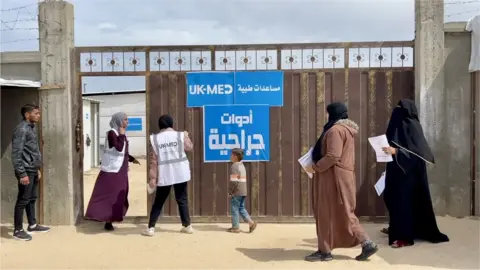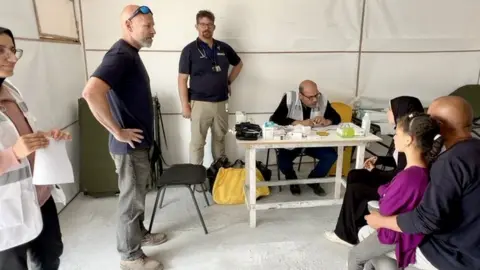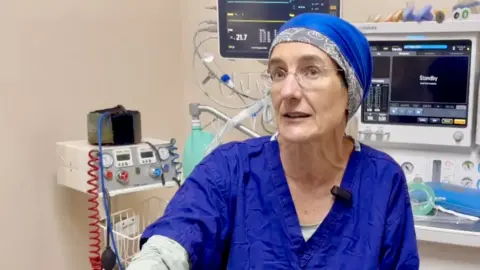First UK-funded field hospital opens in Gaza
 BBC
BBCThe first UK-funded field hospital in Gaza aims to be fully functioning in days, with treatment for everything from minor illnesses to bullet wounds.
It has been set up by the aid organisation UK-Med, which deploys many NHS staff to international emergencies.
The facility is based near Rafah, where 1.5 million Palestinians are crammed in, having fled other parts of Gaza.
"The scale of the need is simply staggering," UK-Med's chief executive David Wightwick told the BBC
He was speaking over the noise of hammering and banging as construction continued in the desert sands of Al Mawasi.
"There are very few services of any kind and the health services have been eroded to the extent that if you are sick, if you are ill, if you are wounded, you are in a very difficult situation."

The field hospital - which was despatched from Manchester - will eventually cover the size of two football fields, but getting started hasn't been easy.
When the UK-Med trucks were held up at the border, David and his team began building with local timber from destroyed buildings.
"It took a lot of negotiation to get land, and it took a lot of negotiation to get things across the border," he said.
"It's been a challenge to find staff. It has been a challenge to communicate, none of the phones work, none of the internet works, and everything somehow has to be made to work in order to bring essential urgent life-saving services to people."
The team are already seeing about 100 outpatients a day at the field hospital and expect to double that soon.
UK-Med is already running mobile clinics that go out into the community in Gaza. "They have definitely seen cases of acute malnutrition in very young children," David said.
A surgical team from the aid group has been working in the chaos of the Al Aqsa hospital - the only hospital functioning in the centre of the Gaza Strip.
The wards and corridors are teeming with patients, and with families seeking shelter, who have bedded down on the floor. It's hard to get a trolley through, but when we visited, a 12-year-old boy called Anas was on his way to surgery with a broken leg and wounds to his face.
Anas said that he was playing when his neighbourhood was bombed.
He was injured, and his mother and six-month-old baby brother were killed. "May God have mercy on their souls," he said.

UK-Med orthopaedic trauma surgeon Saba Papuashvili was waiting for Anas in the operating room. "He's a brave boy," he said.
The surgery went well. Anas will recover but the team have seen some of the worst that war can do, according to anaesthetist Judith Kendall.
"I have worked in many warzones over the past nine years," she told the BBC. "I think what shocked me about this particular context is the number of children injured that we are seeing, and the extent of those injuries. They are life-changing injuries that a child will have to live with."
Gaza's hospitals aren't just overwhelmed. They are often under attack from Israeli forces. Israel claims that Hamas used hospitals as cover - a claim denied by health officials and medical staff.
The UK-Med team understand the danger, said Mark Shaw, from West Yorkshire, who has previously worked in Ukraine.
"We recognise the risks, and we accept the risk which is why we are here in a humanitarian sense," he said. "The worst injuries we are seeing are the amputations, and blast injures, especially in young children."
Back in Al Mawasi, more trucks have arrived, and another hangar has been erected.
If there is ground invasion in Rafah - as Israel is threatening - the British field hospital could be crucial.
